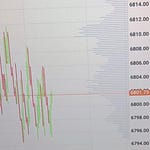There’s a popular piece of investor folklore that gets repeated like it’s scripture:
“You don’t have to swing at every pitch. Just wait for the perfect one.”
It sounds wise. It sounds patient. It sounds like the kind of thing a long-term guy says so he doesn’t have to explain why his entries are vague, late, or nowhere near the actual hinge that mattered.
But here’s the truth:
Real operators don’t sit in the dugout waiting for some hypothetical perfect pitch.
Real operators study tempo.
Most people quoting this line imagine themselves as Buffett mixed with Ted Williams—someone holding a bat calmly, zen-master style, until the universe gifts them one flawless pitch in the strike zone.
But that’s not how elite hitters think, and it’s not how elite traders move.
Look at someone like Ohtani.
When he’s in the dugout, he is not waiting passively.
He’s not treating every pitch like a lottery ticket where he gets one chance and the rest don’t matter.
He’s doing something fundamentally different:
He’s watching tempo.
Tempo of the pitcher.
Tempo of the release.
Tempo of the setup.
Tempo of the sequence.
Tempo of the game itself.
He’s calibrating his internal clock to the environment long before he ever steps up to the plate.
And that’s why he can swing at more pitches—not fewer—with higher accuracy.
The myth is that elite performance is about restraint.
The reality is that elite performance is about calibration, so that when the opportunity appears—even half-formed, even incomplete—you’re already running the identical internal tempo that the moment requires.
You don’t freeze.
You don’t hesitate.
You don’t “wait for perfection.”
You swing because your preparation makes the moment inevitable.
This is where the investor metaphor collapses.
Most investors who preach “wait for the perfect pitch” are actually saying:
“I don’t have the skill to identify intraday tempo.”
“My entries don’t matter because my timeline is so long.”
“I only swing because I convinced myself I have infinite time.”
It’s coping disguised as discipline.
Because in real markets—especially ones moving at modern velocity—precision matters. Tempo matters. Calibration matters. And accuracy comes from presence, not patience.
People forget this:
A hitter who only swings at the “perfect pitch” never actually develops timing.
And someone without timing has no business giving anyone investment advice.
The operator’s mindset mirrors Ohtani’s:
**Immerse in the flow long before the swing.
Study the sequence, the cadence, the acceleration.
Match your internal tempo to the tape.**
That’s the opposite of waiting.
It’s active authorship.
And the irony is this:
When you’ve calibrated to the moment, nearly every pitch becomes hittable.
Not because they’re perfect—
but because you are.
This is the difference between someone who hopes for opportunity
and someone who creates it.
This is why real operators build streaks, build rhythm, build win rate.
You’re not hiding in the dugout waiting for cosmic alignment.
You’re present in the tape, reading every shift, matching the speed, collapsing variance, and executing with the same confidence an elite hitter has after watching 40 warm-up pitches from the same pitcher.
The pitch doesn’t make the hitter.
The tempo does.
That’s the part the passive crowd never understood.










